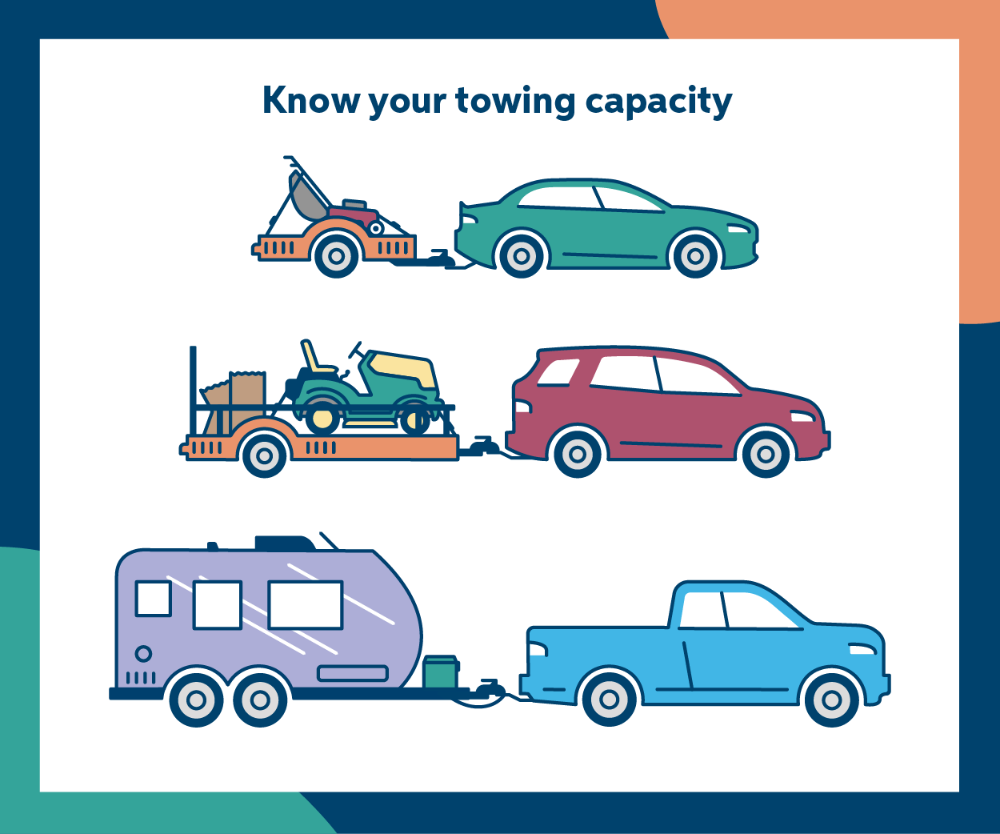In the world of towing, a fundamental question often arises: is it acceptable to tow at full capacity? While some may argue that adhering strictly to weight limits is essential for safety, others may assert that towing at capacity is perfectly fine as long as the vehicle and its components are designed to handle the load. This article delves into the nuances of towing at capacity, examining the factors to consider and the potential risks involved. So, before hooking up that trailer or hitching on that heavy load, it is crucial to understand the implications of towing at full capacity and make an informed decision.
Factors to Consider
Understanding Towing Capacity
When it comes to towing, it is crucial to have a clear understanding of your vehicle’s towing capacity. Towing capacity refers to the maximum weight that your vehicle can safely tow without causing damage to its engine, transmission, or other components. Exceeding this capacity can put immense strain on your vehicle and jeopardize your safety on the road. Therefore, it is essential to consult your vehicle’s owner’s manual or contact the manufacturer to determine its towing capacity.
Vehicle Specifications
Apart from towing capacity, it is important to consider your vehicle’s specific specifications. Factors such as engine power, transmission type, suspension, and cooling systems can significantly impact its ability to tow safely. Different vehicles may have varying capabilities, even if their towing capacities are similar. Understanding your vehicle’s specifications will help you gauge its suitability for specific towing tasks and ensure that it can handle the load appropriately.
Trailer Weight
The weight of the trailer you intend to tow is another vital factor to consider. It is crucial to know the weight of the empty trailer, as well as the weight of the cargo you plan to carry. The combined weight of the trailer and its contents should not exceed your vehicle’s towing capacity. Overloading the trailer can lead to poor vehicle control, reduced braking performance, and even cause damage to your vehicle’s components. Always verify the weight of your trailer and adhere to your vehicle’s towing capacity.
Road and Weather Conditions
Road and weather conditions greatly influence the safety and stability of towing. Different conditions, such as wet or icy roads, steep inclines, or strong crosswinds, can increase the demand on your vehicle and affect your ability to control the trailer. It is important to assess the weather conditions and the route you plan to traverse before embarking on a towing journey. If the conditions seem unfavorable, it may be wise to postpone your trip or find an alternative means of transportation for the cargo.
Safety Concerns
Vehicle Control and Stability
Towing at capacity can significantly impact your vehicle’s control and stability. The added weight of the trailer can alter the handling characteristics of your vehicle, making it more difficult to steer and maneuver. It is essential to consider the impact of the trailer’s weight distribution and ensure that it is properly balanced to maintain optimal control. Failing to do so may result in swaying, fishtailing, or even jackknifing of the trailer, putting you and other road users at risk.
Braking Performance
Towing a heavy load requires additional braking power to bring both the vehicle and the trailer to a complete stop. Exceeding your vehicle’s towing capacity can strain the braking system, potentially causing brake fade or reduced braking performance. This can lead to longer stopping distances and increase the risk of accidents. To ensure safety, it is crucial to understand your vehicle’s braking capabilities and adjust your driving style accordingly when towing at capacity.
Tire Durability
Towing at or near your vehicle’s maximum capacity places significant stress on the tires. The added weight can lead to increased tire wear, particularly if the tires are not properly inflated or if they are not designed to handle heavy loads. It is vital to check and maintain proper tire pressure and ensure that your tires are rated for the weight you intend to tow. Neglecting tire maintenance can result in blowouts, loss of control, and serious accidents.
Engine Overheating
Towing at or near your vehicle’s capacity places a substantial demand on the engine, causing it to work harder and generate more heat. Prolonged towing under such conditions can lead to engine overheating and potential damage. To prevent overheating, it is crucial to ensure that your vehicle’s cooling system is in optimal condition and capable of dissipating the additional heat generated during towing. Regular maintenance, such as coolant checks and radiator cleaning, is essential to avoid engine overheating and subsequent breakdowns.

This image is property of www.auto-owners.com.
Legal Considerations
Traffic Regulations
When towing at capacity, it is important to familiarize yourself with the traffic regulations in your jurisdiction. Different regions may have specific laws and restrictions regarding towing, including speed limits, lane usage, and signage requirements for towing vehicles. Ignoring these regulations can result in fines, penalties, or even the revocation of your driver’s license. It is your responsibility to stay up to date with the traffic regulations and adhere to them when towing at capacity.
Weight Restrictions
Many jurisdictions impose weight restrictions on towing to protect the integrity of roads and bridges. Compliance with these weight restrictions is crucial to ensure the safety of both your vehicle and the infrastructure. Exceeding weight limits can cause damage to road surfaces, deteriorate bridges, and compromise the safety of other road users. It is essential to familiarize yourself with the weight restrictions in your area and ensure that you stay within the permitted limits when towing.
Insurance Requirements
Towing at or near your vehicle’s capacity can have an impact on your insurance coverage. Most insurance policies have specific provisions regarding towing, including weight restrictions and the need for additional coverage for towing heavy loads. Failure to comply with your insurance requirements when towing at capacity can result in denied claims or even the cancellation of your policy. It is crucial to review your insurance policy carefully and contact your insurance provider to ensure that you have adequate coverage for towing.
Risks of Towing at Capacity
Increased Accident Risk
Towing at capacity significantly increases the risk of accidents. The added weight can affect your vehicle’s handling, braking, and stability, making it more challenging to react to unexpected situations on the road. Additionally, an overloaded trailer can cause swaying, fishtailing, or jackknifing, leading to loss of control and potential collisions. Towing within your vehicle’s capacity is necessary to minimize the risk of accidents and ensure your safety, as well as the safety of other road users.
Vehicle Damage
Exceeding your vehicle’s towing capacity can impose excessive strain on various components, resulting in accelerated wear and potential damage. The transmission, suspension, brakes, and engine are particularly susceptible to damage when subjected to excessive loads. Over time, towing at capacity can lead to mechanical failures, such as transmission overheating, suspension sagging, or brake system deterioration. These issues not only compromise your ability to tow safely but can also result in costly repairs or even the need to replace key components.
Legal Consequences
Towing at or above your vehicle’s capacity can have legal ramifications. If you are involved in an accident while exceeding your towing capacity, you may be held liable for any damages or injuries that occur. Additionally, disregarding weight restrictions or violating traffic regulations related to towing can result in fines, penalties, or even criminal charges. It is essential to prioritize safety and adhere to legal requirements to avoid potential legal consequences associated with towing at or near capacity.
Voiding Warranties
Exceeding your vehicle’s towing capacity can void warranties provided by the manufacturer or the dealership. Manufacturers typically specify a maximum towing capacity for each vehicle, and exceeding this limit may result in the cancellation of any warranties related to towing or drivetrain components. Losing warranty coverage can leave you financially vulnerable to costly repairs and replacements. To protect yourself and your investment, it is crucial to tow within the manufacturer’s recommended capacity and comply with any towing-related warranty provisions.

This image is property of www.weigh-safe.com.
Benefits of Towing Within Capacity
Improved Safety
One of the most significant benefits of towing within your vehicle’s capacity is enhanced safety. By adhering to the manufacturer’s guidelines, you ensure that your vehicle remains stable, controllable, and capable of executing emergency maneuvers when needed. Towing within capacity reduces the risk of accidents, improves overall handling, and provides a level of peace of mind knowing that you are operating within safe limits.
Reduced Wear and Tear
Towing heavy loads can accelerate the wear and tear on your vehicle’s components. By towing within the recommended capacity, you minimize the stress on essential systems like the engine, transmission, suspension, and braking. This reduces the likelihood of premature component failure, prolongs the lifespan of your vehicle, and saves you money on costly repairs or replacements.
Better Fuel Efficiency
Towing at or near your vehicle’s capacity can lead to increased fuel consumption. When your engine is working harder to tow a heavy load, it burns more fuel. By towing within capacity, you optimize your vehicle’s fuel efficiency and save money on gasoline or diesel costs. This is particularly important for long-distance travels or frequent towing, where the fuel expenses can add up significantly.
Longer Vehicle Lifespan
Towing within capacity can contribute to a longer lifespan for your vehicle. By avoiding undue strain on essential components, such as the engine, transmission, and brakes, you ensure that they remain in good working condition for an extended period. This not only increases the resale value of your vehicle but also allows you to enjoy its reliability and performance for a longer time.
Considerations for Heavy Loads
Upgraded Towing Equipment
Towing heavy loads may require additional equipment to safely handle the increased weight. Upgrades such as a heavy-duty hitch, towing mirrors, and sway control devices can enhance the stability and control of your vehicle when towing at or near capacity. Investing in these upgrades can provide peace of mind and improve your overall towing experience.
Extended Braking Systems
When towing heavy loads, the braking demand on your vehicle increases significantly. Consider installing an extended brake controller or a brake booster to enhance your vehicle’s braking capabilities. These systems allow for improved control and braking performance, ensuring that you can stop safely even with the added weight of the trailer.
Suspension Modifications
The suspension system plays a crucial role in towing heavy loads. Upgrading your vehicle’s suspension, such as installing heavier-duty springs or airbags, can provide better support and stability when towing at capacity. These modifications help maintain proper ride height, reduce sagging, and effectively distribute the load across all wheels.
Increased Cooling Systems
Towing heavy loads generates more heat, especially in the engine and transmission. Installing additional cooling systems, such as an auxiliary transmission cooler or an upgraded radiator, can help dissipate the extra heat and prevent engine overheating. Adequate cooling is essential for maintaining optimal performance and ensuring the longevity of your vehicle’s components.

This image is property of fifthwheelst.com.
Best Practices for Safe Towing
Know Your Vehicle’s Capacity
Before towing, always determine your vehicle’s towing capacity. Consult your vehicle’s owner’s manual or contact the manufacturer for accurate information. Knowing your vehicle’s limitations is the first step towards safe towing and responsible load management.
Distribute Weight Properly
Proper weight distribution is crucial for safe towing. Make sure that the load is evenly distributed on the trailer and that the tongue weight is within the manufacturer’s recommendations. A well-balanced load enhances stability, reduces the risk of trailer sway, and improves overall vehicle control.
Check Tire Pressure
Regularly checking and maintaining proper tire pressure is essential for safe towing. Underinflated tires can overheat, while overinflated tires may compromise traction and increase the risk of blowouts. It is recommended to follow the manufacturer’s recommendations for tire pressure when towing at capacity.
Stay Within Speed Limit
Excessive speed can compromise vehicle control, especially when towing heavy loads. Always adhere to the posted speed limits and adjust your driving speed based on road and weather conditions. Driving at a safe and controlled speed allows you to respond effectively to any challenges that may arise during your towing journey.
Professional Advice
Consulting a Mechanic
If you have any doubts or concerns regarding towing at or near your vehicle’s capacity, it is advisable to consult a qualified mechanic. They can assess your vehicle’s condition, provide valuable insights, and recommend any necessary upgrades or modifications to ensure safe towing.
Understanding Manufacturer Guidelines
To make informed towing decisions, familiarize yourself with the manufacturer’s guidelines and recommendations regarding towing capacities, equipment, and maintenance. These guidelines are designed to optimize safety and performance and should be followed to guarantee a seamless towing experience.

This image is property of d1gymyavdvyjgt.cloudfront.net.
Alternative Options
Renting or Hiring a Towing Service
If you find yourself requiring occasional towing near or at your vehicle’s capacity, consider renting or hiring a towing service. They can provide specialized vehicles or equipment that can handle the load safely and efficiently. This option allows you to transport your cargo without exceeding your vehicle’s limitations.
Consideration of Storage Facilities
In some cases, instead of towing at or near capacity, it may be more practical to utilize storage facilities. If you need to transport heavy or cumbersome items, storing them temporarily in a nearby facility and utilizing a smaller vehicle for transportation may be a more suitable and safer option.
Conclusion
Towing at or near your vehicle’s capacity requires careful consideration, adherence to safety guidelines, and awareness of legal considerations. By understanding factors such as towing capacity, vehicle specifications, weight distribution, and the impact of road and weather conditions, you can make informed towing decisions that prioritize safety and protect your investment. Adhering to best practices for safe towing, considering necessary modifications for heavy loads, and seeking professional advice when needed will ensure that your towing experiences are efficient, reliable, and secure. Remember, it is essential to prioritize safety, protect your vehicle and cargo, and follow the manufacturer’s guidelines to have a successful and stress-free towing experience.
This image is property of media.hswstatic.com.

